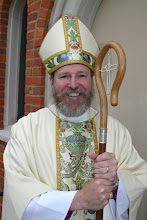Indaba is a Zulu word that refers to the practice of meeting to discuss an important concern, a practice in which all hear and are heard, and together listen for God. The goal is not simply to understand each other’s desires and convictions, but to comprehend the issue itself completely, through the perspectives of all. It is by that deep understanding of the issue or challenge that Indaba participants are prepared, by the spirit of holiness and one another, to find a way forward.
Monday we added to our daily schedule Indaba Groups. After the morning session of Bible Study, we come together with four other Bible Study groups into a larger body of some 40 bishops spanning continents, languages, cultures, and theologies, many of whose politics I can qualify by personal knowledge or reputation. In the Indaba Group we explore the responsibilities of episcopal leadership in our varied contexts, the complexities of provincial dynamics and polity, and the nature and challenges of the Communion. The format varies from day to day, as do the configurations of bishops since we often divide into groups of four to six for discussion, but always it involves serious reflection on the particular aspect of mission or ministry being addressed and coming up with a statement from each conversation that reflects the combined offering of the small group. Those learnings are then crafted by a “reporter” into a statement from the whole Indaba group that is in turn delivered, along with those from the other Indaba Groups, to a representative committee that makes of them a common report.
This is hard work. It is essential to hear each companion in this process with an open heart, making room in the conversation and in myself for both the truth being generously borne and its bearer. At the same time, it is important to discern thoughtfully what it is I have to offer. I find myself often wading through the urgent, the emotional, the reactive, and the sympathetic in search of the important, that experience, conviction, struggle, or perspective that will contribute most authentically from the Diocese of Ohio, from The Episcopal Church, and from me to make the whole more complete. When I look around the room at the forty-odd (or is it forty odd) souls in my Indaba Group, I cannot imagine anyone intentionally drawing these particular folks together to do much of anything. Yet when we speak, listen, and articulate our common and comprehensive learning, I clearly see that each participant is indeed an intentional gift. I confess that more than once I have looked around for the Exchange Department, but we are only two days into Indaba.
I am imagining that in Indaba the written product is only one part of the expected result. Perhaps more important may be the transformation of the participating community. I am wondering whether this process may be a model for a Communion whose covenant is simply, “I will stay in this conversation with you until we get beyond ourselves to that which God needs all of our eyes to see, all of our ears to hear, all of our hands to heal, and all of our hearts to love.”
Subscribe to:
Post Comments (Atom)




2 comments:
Mark, along with the sermon from the Bishop of Colombo, your blogs express well why our continuing place within the Anglican Communion matters deeply. Thanks.
Thank you Bishop Mark for your love, support, and dedication to God's Church and for God's people. I am praying for you and all the bishops every day.
Vincent Black
Post a Comment